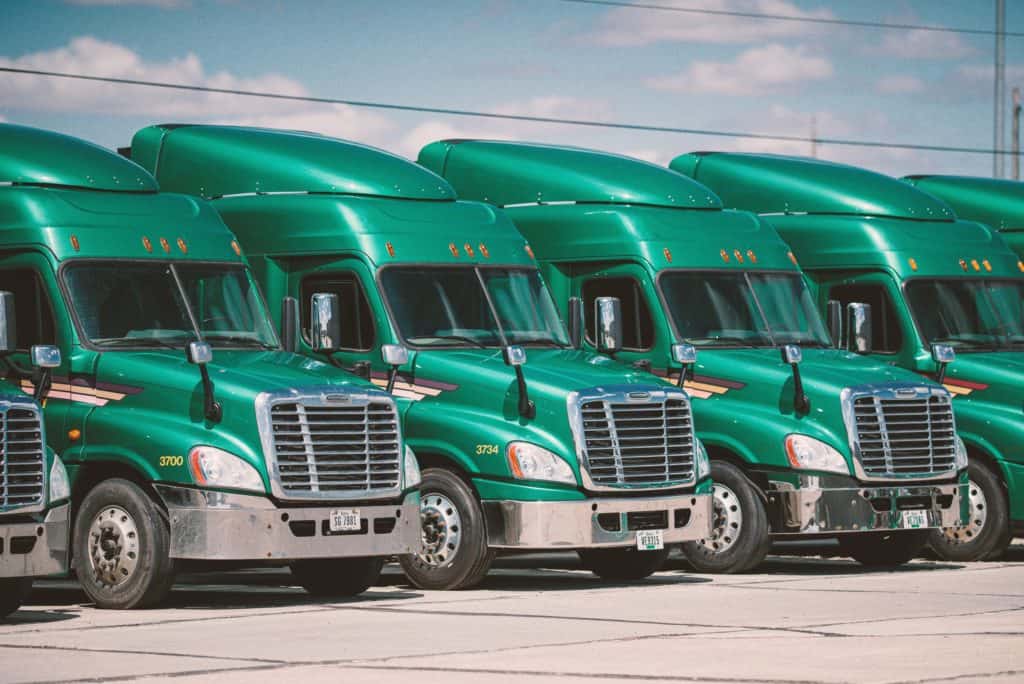The trucking industry has gone through tremendous growth, and comprises companies that provide transportation and logistics services. Though lucrative, owning a trucking company comes with a lot of costs, especially when it comes to making big investments in fleets. Labor, fuel, operating expansion, and fleet maintenance are some of the expenses that affect the profitability of trucking companies. Financing can be a good option to step in and cover immediate costs, as well as to provide investment into your trucking business’s growth.
It’s worth noting that the logistics industry as a whole has experienced a great deal of growth in the last several years with the rapid rise in e-commerce and online shopping and as a result of the pandemic. It is certainly not a sector that is going to see less growth in the future, so it could be an optimal time to launch your trucking startup or expand your existing operation. The industry will likely take on more innovations in the next 5-7 and further adopt technology to help make transport safer, more efficient and more environmentally friendly with more and more people purchasing items from suppliers and vendors not necessarily related to the areas they live.
There are a lot of financing options available for trucking companies. Typically, both traditional and alternative lenders like to fund trucking companies, as logistics is seen as a relatively steady business with a lower risk profile than, say, e-commerce, where sales can fluctuate from one month to the next. With so many options, it’s important to know which kind of financing is the best fit for each specific situation, so that you can shop around and be sure you’re getting the best terms.
Financing for Trucking Companies: All Your Options
There are a variety of funding options for trucking companies, from trucking business loans to factoring and credit cards. Each one is quite different in nature — some have longer application processes, while others can be more expensive forms of financing. That said, each product can serve a different purpose. For example, the right credit card might be best for covering fuel costs, while factoring may be the best method for providing working capital in between pay days. Let’s take a look at all your loan options.
Long Term Small Business Loans
Long term small business loans typically serve as the most desirable funding options, as they often come with the higher loan amounts and lower interest rates spread over a longer payback period. Most SBA loans also fall under this category, with generally the lowest cost of funding on the market, as well as enviable repayment terms. These perks don’t come for free, however, as you generally will need excellent credit, over a year in business, and healthy annual revenue to qualify. In some cases, they can also require good personal credit as a means of securing the loan. Long term small business loans can also come with a lengthy application process.
Long term loans can provide your business with the capital you need to expand. They can be very desirable for situations such as buying more trucks, undertaking repairs, purchasing new equipment, and hiring more employees. Just keep in mind that some long term loans will have collateral requirements — in cases like these, your trucks and equipment can be seized in the event of default on the loan.
Pros of long term loans for trucking companies
- Tend to have lower interest rates than other options
- Lower monthly payments, as they are paid back over a longer period of time
- Possible to borrow with no cash collateral; your trucks and equipment serve as collateral
Cons of long term loans for trucking companies
- Typically long approval process
- Need a high credit score and annual revenue
- Usually requires a down payment
- Trucks and equipment can be seized if being used as collateral
SBA Loans for Trucking
Small Business Administration (SBA) loans are a specific type of long term loan. They are provided by lenders, but backed by the SBA (the SBA does not lend money directly). As previously stated, these come with great rates and long payback periods, making them highly desirable among small business owners. As a trucking company, there are a few SBA loans that could be a good fit.
SBA CDC/504 Loans
The SBA’s 504 loan product is available through Certified Development Companies (CDCs). To apply. You’ll first need to find one in your area through the SBA’s website. The 504 loan can be used for big purchases, which includes long-term machinery and equipment (ie, trucks). It cannot be used for working capital.
SBA 504/CDC loans are often attractive for their interest rates (according to the SBA, these total approximately 3% of the debt) and for their long payback terms at 10 years, 20 years, and 25 years. To qualify, you must have a tangible net worth of less than $15 million, and an average net income of less than $5 million after federal income taxes for the two years preceding your application.
SBA 7(a) Loans
Like the SBA’s 504 loans, the 7(a) loan can be used to purchase equipment such as trucks. However, it is a bit more flexible than the 504 loan in that it can also be used for working capital in addition to other expenses laid out by the SBA. You will have to apply for an SBA 7(a) through a lender, however, unlike the 504 loan, it does not have to be through a Certified Development Company — any SBA lender will do.
The payback terms on the SBA 7(a) loan are a bit more variable, and will depend on your business and creditworthiness. The SBA does cap interest rates, and will guarantee 85% of a loan up to $150,000, or 75% of a loan greater than $150,000. This does not imply forgiveness (as in a PPP loan or grant), but does significantly reduce your liability and collateral costs.
SBA Microloans
If you need under $50,000 in financing, then consider SBA microloans. Similar to the SBA 7(a) loans, they can be used for a variety of expenses, including working capital and purchasing equipment. The interest rates vary depending on your loan provider, but tend to range from 8 to 13%. The maximum payback period allowed is six years.
SBA microloans are administered by local nonprofit community-based organizations, so you won’t be able to apply through your bank. Instead, you’ll need to contact your SBA district office, and have them provide a list of authorized lenders.
Pros of SBA Loans for Trucking Companies
- Low interest rates
- Favorable payback period
- Less collateral requirements
Cons of SBA Loans for Trucking Companies
- Difficult to qualify for — must have good credit history and usually over a year in business
- Typically longer application process (up to 2 months or longer)
Equipment Financing
If you’re looking to fund equipment purchases, then why not look into equipment financing? This type of financing is very specific and cannot be used for everyday costs, but the perks can outweigh these drawbacks for trucking companies looking to expand their fleets, or make other big equipment purchases.
With equipment loans, whatever you are purchasing becomes the collateral. That is, if you default, instead of having collections being put on your cash reserves or other assets, the financing company will simply repossess the equipment.
Pros of Equipment Financing for Trucking Companies
- Typically low interest rates
- Favorable payback period (usually 12-72 months)
- Collateral is the equipment
Cons of Equipment Financing for Trucking Companies
- Difficult to qualify for — must have good credit
- Sometimes requires a significant down payment
Lines of Credit for Trucking
A business line of credit is a short-term funding option that allows a business to access a specific amount of funds. It’s somewhat similar to a credit card in concept, in that it allows you to draw an amount you need when you need it, up to your credit limit as determined by your lender. It’s a flexible form of business financing that doesn’t generally have any restrictions on usage, and where interest is usually only charged for the amount of the credit line that you use.
A business line of credit can be a good option for a trucking company that wants to spread the funds across costs, and doesn’t want to be restricted in their usage. For example, an SBA 504 loan will restrict you to only spending the money on approved costs (equipment). A line of credit won’t do that — you can divvy it up between business expenses such as repair costs, gas, big purchases, and payroll if you so wish.
Pros of a Line of Credit for Trucking
- Only pay interest on what you use
- Enjoy constant access to funds
- Few restrictions apply on the loan use
Cons of a Line of Credit for Trucking
- Usually shorter payback period than a term loan
- Interest rates can be higher than term loans and can vary significantly
- Typically requires a good credit score
Freight Factoring for Trucking Companies
Factoring is a form of financing that allows companies to “sell” their invoices for cash. Freight factoring is a type of invoice factoring that is specific to trucking. It allows you to sell an invoice for a load in exchange for immediate cash rather than waiting for it to be fulfilled. This can provide some assurance of cash flow to cover business expenses in between waiting for invoices to be paid. You pay the freight factoring company back with a percentage of the invoice value.
Here’s what’s involved in the factoring process:
- A customer will hire your trucking business to haul and deliver a load
- You will submit the customer invoice to the freight factoring company
- If the customer is approved, your trucking company will receive an amount of the invoice or load value upon load delivery from the freight factoring company
- Your trucking company’s customer will pay the invoice to the freight factoring company
Pros of Freight Factoring
- Fast process
- Provides working capital and steadier cash flow
- Typically don’t need a high credit score
Cons of Freight Factoring
- Usually high cost of borrowing
- If a customer doesn’t pay their invoice, you are still on the hook for repayment
Merchant Cash Advances (MCA's)
Merchant cash advances (MCA's) are one of the easiest forms of financing to qualify for, especially as a new business or one with bad credit. MCA’s are not business loans, but a cash advance based on the volume of your credit card receipts. You repay the lump sum advance with a percentage of your sales.
MCA's are among the most expensive forms of financing, but they can be great for emergencies or for businesses who can’t qualify for anything else. If you have bad credit or in a pinch like say, faced with a big unexpected repair bill, and need fast cash, then an MCA could be a good fit.
Pros of Merchant Cash Advance for Trucking
- Fast access to funds
- Don’t need a strong credit score to qualify
Cons of Merchant Cash Advance for Trucking
- Can be very expensive
- Must accept credit cards
Last Word on Financing for Trucking Companies
There are many small business trucking loans to choose from that can meet a variety of business needs and provide small business owners with financing no matter where they are in their credit journeys. In a nutshell, SBA loans are generally considered the gold standard when it comes to low costs and limited liability if you can get one, with other small business term loans and equipment financing usually providing the best payment terms. However, these larger loans are often more difficult to get, and can come with restrictions. For the trucking business owner who’s just looking for some extra flexibility when it comes to cash flow, or to cover emergency repairs, other forms of financing, such as a line of credit, might be preferable.


